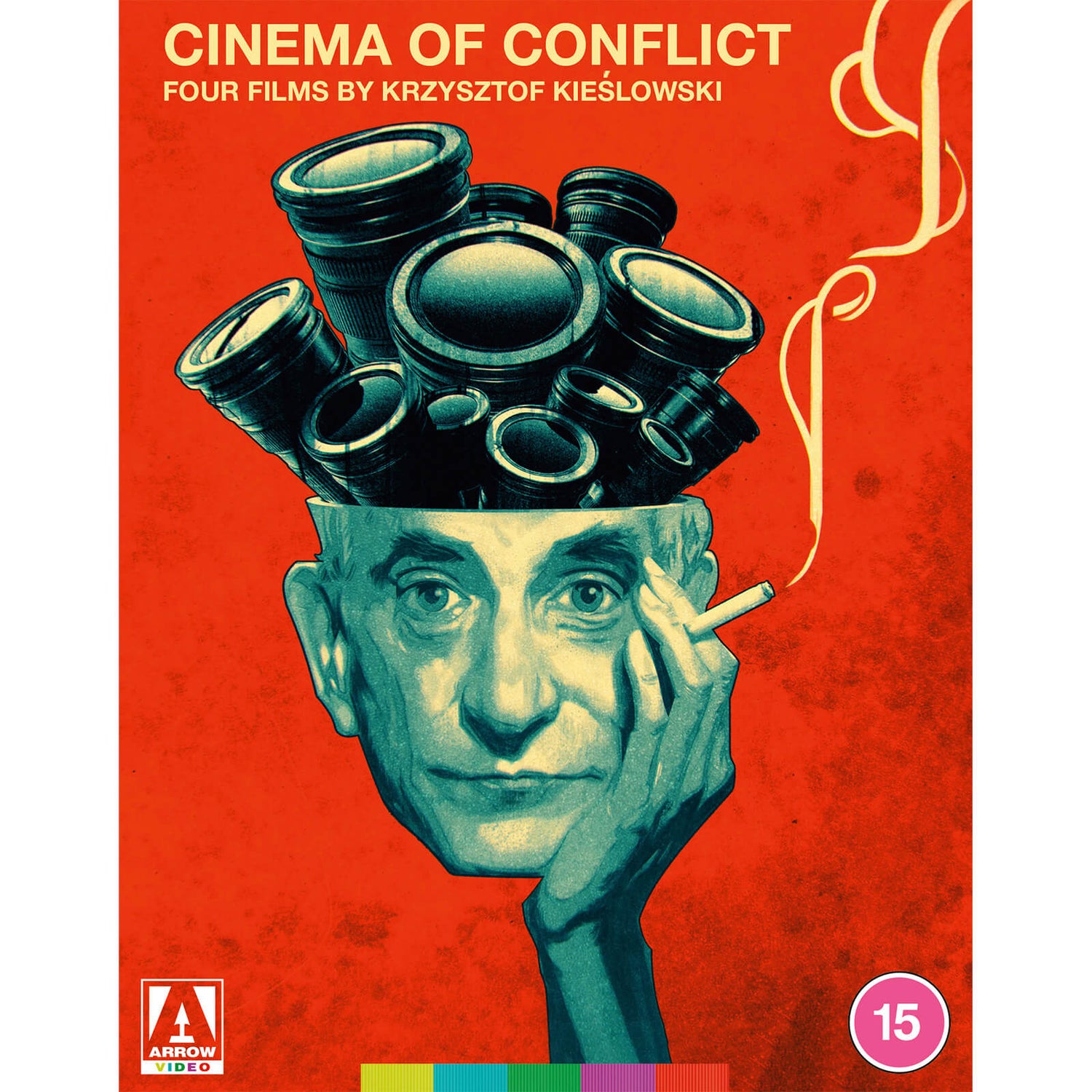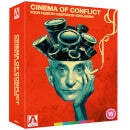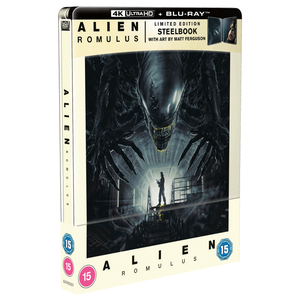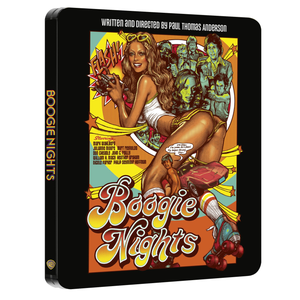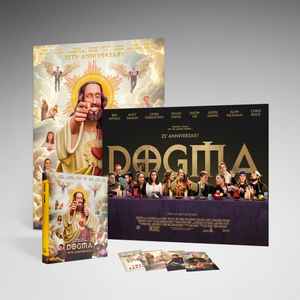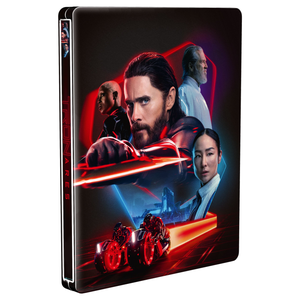Ajouté au panier
Cinema of Conflict
70,49 €
Few names are as synonymous with Polish cinema as that of Krzysztof Kieślowski, the renowned auteur responsible for the Dekalog and the Three Colours trilogy. Prior to the fall of the Berlin Wall and his subsequent creative and critical success in France, Kieślowski plied his trade within the confines of the Eastern Bloc, capturing the realities of everyday life under Soviet rule. This collection gathers his four earliest narrative feature films, encapsulating the years 1976–1984.
In 1976’s The Scar, a well-intentioned Party loyalist is charged with overseeing the construction of a new chemical plant in the face of fierce resistance and is forced to confront the conflict between his good intentions and local opposition. In 1979’s Camera Buff, a family man and amateur filmmaker experiences a dramatic change in fortunes when his newfound hobby opens up new horizons but also results in deep marital and philosophical conflicts. Blind Chance, completed in 1981 and denied a release in its native Poland until 1987, presents three possible outcomes to a single, seemingly banal event – a young medical student running to catch a train – and, in the process, explores the relationship between chance and choice. Finally, in 1984’s No End, a recently bereaved translator juggles the conflicting demands of her work, caring for her son and her continued visions of her late husband, all against the backdrop of a Poland under the grip of martial law.
As socially conscious as Kieślowski’s earlier documentary shorts, this quartet of films covers a tumultuous period in Polish and Eastern European history, shot with unflinching realism by a filmmaker of distinction.
Special Features:
- High Definition Blu-ray (1080p) presentations of all four films
- Original lossless mono audio for all films
- Optional English subtitles for all films
- Audio commentary on Camera Buff by Annette Insdorf, author of Double Lives, Second Chances: The Cinema of Krzysztof Kieślowski
- Audio commentary on Blind Chance by film historian Michael Brooke
- Ghost of a Chance, a visual essay on No End by Adrian Martin and Cristina Álvarez López
- Moral and Martial Anxieties, a discussion with Michael Brooke, exploring the brief and remarkable Polish film renaissance of the turn of the 1980s
- Introductions by scholar and critic Michał Oleszczyk to all films
- Michał Oleszczyk looks through archive materials for each film
- Archival interviews with filmmakers Agnieszka Holland and Krzysztof Zanussi, cinematographers Slawomir Idziak and Jacek Petrycki, actress Grażyna Szapołowska, sound designer Michal Zarnecki, critic Annette Insdorf and Kieślowski collaborator Irena Strzałkowska
- Three short films by Kieślowski: The Office (1966), Concert of Requests (1967) and Talking Heads (1980)
- Workshop Exercises, a 1987 short film by Marcel Łoziński, Kieślowski’s colleague at the Warsaw Documentary Film Studio
- Reversible sleeves featuring original and newly commissioned artwork by Corey Brickley
- Arrow Video
- 450 mins appeox
- Krzysztof Kieślowski
- 15
- Franciszek Pieczka
- Jerzy Stuhr
- Boguslow Linda
- Grazyna Szapolowska
English
- 1.66:1
- 1.33:1
- Polish
- 4
- B
- Arrow Video
Cinema of Conflict
70,49 €
Rupture de stock
Livraison et retour
Few names are as synonymous with Polish cinema as that of Krzysztof Kieślowski, the renowned auteur responsible for the Dekalog and the Three Colours trilogy. Prior to the fall of the Berlin Wall and his subsequent creative and critical success in France, Kieślowski plied his trade within the confines of the Eastern Bloc, capturing the realities of everyday life under Soviet rule. This collection gathers his four earliest narrative feature films, encapsulating the years 1976–1984.
In 1976’s The Scar, a well-intentioned Party loyalist is charged with overseeing the construction of a new chemical plant in the face of fierce resistance and is forced to confront the conflict between his good intentions and local opposition. In 1979’s Camera Buff, a family man and amateur filmmaker experiences a dramatic change in fortunes when his newfound hobby opens up new horizons but also results in deep marital and philosophical conflicts. Blind Chance, completed in 1981 and denied a release in its native Poland until 1987, presents three possible outcomes to a single, seemingly banal event – a young medical student running to catch a train – and, in the process, explores the relationship between chance and choice. Finally, in 1984’s No End, a recently bereaved translator juggles the conflicting demands of her work, caring for her son and her continued visions of her late husband, all against the backdrop of a Poland under the grip of martial law.
As socially conscious as Kieślowski’s earlier documentary shorts, this quartet of films covers a tumultuous period in Polish and Eastern European history, shot with unflinching realism by a filmmaker of distinction.
Special Features:
- High Definition Blu-ray (1080p) presentations of all four films
- Original lossless mono audio for all films
- Optional English subtitles for all films
- Audio commentary on Camera Buff by Annette Insdorf, author of Double Lives, Second Chances: The Cinema of Krzysztof Kieślowski
- Audio commentary on Blind Chance by film historian Michael Brooke
- Ghost of a Chance, a visual essay on No End by Adrian Martin and Cristina Álvarez López
- Moral and Martial Anxieties, a discussion with Michael Brooke, exploring the brief and remarkable Polish film renaissance of the turn of the 1980s
- Introductions by scholar and critic Michał Oleszczyk to all films
- Michał Oleszczyk looks through archive materials for each film
- Archival interviews with filmmakers Agnieszka Holland and Krzysztof Zanussi, cinematographers Slawomir Idziak and Jacek Petrycki, actress Grażyna Szapołowska, sound designer Michal Zarnecki, critic Annette Insdorf and Kieślowski collaborator Irena Strzałkowska
- Three short films by Kieślowski: The Office (1966), Concert of Requests (1967) and Talking Heads (1980)
- Workshop Exercises, a 1987 short film by Marcel Łoziński, Kieślowski’s colleague at the Warsaw Documentary Film Studio
- Reversible sleeves featuring original and newly commissioned artwork by Corey Brickley
- Arrow Video
- 450 mins appeox
- Krzysztof Kieślowski
- 15
- Franciszek Pieczka
- Jerzy Stuhr
- Boguslow Linda
- Grazyna Szapolowska
English
- 1.66:1
- 1.33:1
- Polish
- 4
- B
- Arrow Video
Avis de clients
Aucun commentaire pour l’instant.
Laissez un commentaire pour aider les autres clients à la recherche d'informations sur ce produit.
